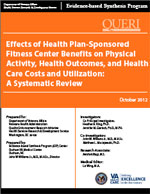
|
Co-Principal Investigators: Heather A. King, Ph.D. Jennifer M. Gierisch, Ph.D., M.P.H. Co-Investigators: John W. Williams Jr., M.D., M.H.Sc. Matthew L. Maciejewski, Ph.D. Evidence-based Synthesis Program (ESP) Center
Durham VA Medical Center
Washington (DC): Department of Veterans Affairs; October 2012 |
Download PDF: Complete Report, Executive Summary, Report, Appendices
Regular physical activity has many positive health benefits, including protection against chronic disease, improved physical and mental health and cognitive function, and better health-related related quality of life. Moreover, lack of physical activity is associated with higher health care costs and utilization. Many Americans, however, do not get the recommended levels of physical activity. For Veterans, Veterans Affairs (VA) health care users are less likely to meet physical activity recommendations and more likely to be physically inactive compared with Veterans who do not use VA health care. Multiple personal, social, and environmental factors influence participation in physical activity. Providing memberships to fitness centers may be a viable option to increase physical activity and the positive health outcomes associated with such activity. Given that most Americans have access to some form of health insurance, health plan promotion of and coverage for fitness center memberships has the potential to address multiple barriers to physical activity (e.g., cost, access) and extend fitness center access to many Americans.
Our objective in this evidence synthesis was to summarize the results of diverse studies of health plan-sponsored fitness center memberships in an effort to understand how these benefits affect physical activity, clinical outcomes, health care costs and utilization, retention of plan members, and member satisfaction.
Effects of Health Plan-Sponsored Fitness Center Benefits on Physical Activity, Health Outcomes, and Healthcare Costs and Utilization (VA HSR&D Management e-Brief)